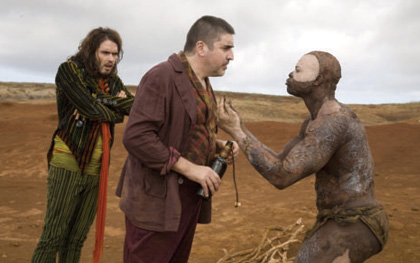Festival postcard
Venice: storm in a bottle

Russell Brand, Alfred Molina and Djimon Hounsou in Julie Taymor’s The Tempest
Venice International Film Festival
Venice, Italy
September 2010
Sender: Nick James
Venice did not quite maintain to its end the quick-change energy of rich genre variety I praised it for in my last postcard. For me, the festival fell away exhausted after Wednesday evening’s screening of Takashi Miike’s samurai revenge drama 13 Assassins, a ferocious remake of an obscure Eichi Kudos film from 1963. Miike’s uncharacteristic but satisfyingly traditional approach proved ideal for highlighting the absurdity of both samurai bluster and Shogunate politics and it allowed the ultra-callous and insane Lord Naritsugu (Gorô Inagaki) – the villain of the festival – to shine as a blackly comic sick wit.
More typical of the festival’s three last days was Monte Hellman’s Road to Nowhere. Cult devotees looking forward this intractable film-within-a-film mystery, written by Variety journalist Steven Gaydos, may find it hard to maintain faith. The ‘director’ in the story tells his writer that his three rules for successful film-making are “casting, casting and casting”, but rarely has a film within a film assembled such a unhappy collection of miscast actors, none of whom manage to bring life or mystery to its proposed conundrum of corruption and murder on a film set.
But it’s to the festival’s final competition film that I’m dedicating the rest of this postcard. It so happens that Shakespeare’s The Tempest, which Julie Taymor has adapted, switching the gender of its main protagonist from male Prospero to female Prospera, is the only play that this writer claims to know well. Indeed, it’s the only play in which I’ve acted – twice, with a five-year gap in between. Like Dame Helen Mirren, I played the monster-slave Caliban in a school production (I was probably much worse than anyone in Hellman’s cast, let alone the great Mirren) and, unlike her, I later played Ferdinand, the romantic lead, in an art-school production. Consequently, I love the play, but know how its corny imagery and sugary sentiments are like traps for the unwary director.
Taymor however sees no difficulties. She seems perfectly happy to take an unimaginative approach. Although Prospero’s lines are regendered for Mirren’s Prospera, Taymor cleaves in every other conceivable way to the bleedin’ obvious: the text is almost entire and barely altered; Caliban (Djimon Hounsou) is an African slave, Ariel (Ben Whishaw) a death-white androgynous Bowie-clone, Miranda (Felicity Jones) and Ferdinand (Reeve Carney) toothsome drips. Fine acting there is: Mirren is intermittently brilliant as Prospera, Alan Cumming and Chris Cooper have fun yet make their line readings count as the conspirators Sebastian and Antonio, and Tom Conti is outstanding as the old kind-hearted bore Gonzalo.
But what finally sets the dead hand’s grip on this film’s gizzard is its appallingly facile CGI effects. From the ship in a storm that looks like a badly painted bottle label to the embarrassing body-doubling and -dividing effects for Ariel to the glowing-coal hell hounds that move in slo-mo while their supposed victims totter in terror like amateur catwalk models, it is all fifth-rate stuff. Even the songs, one of Shakespeare’s gift opportunities to cinema, are thrown away, not by Elliot Goldenthal’s sometimes intriguing melodies but by the singers’ inability to make certain lines clear enough to understand.
Derek Jarman’s The Tempest (1979) was by no means his best work, yet its on-the-cheap inventiveness shows up Taymor’s paucity of innovation here. Better yet is Peter Greenaway’s Prospero’s Books (1991), a highly wrought and somewhat under-rated meditation on renaissance concerns in Shakespeare’s play. If we are such stuff as dreams are made on then I prefer the real dreamers, not the stagers who have little understanding of what to do with a camera.
See also
Venice 2010, part one: Nick James on the early highlights of the festival (online, September 2010)
Venice 2009, part two: Jonathan Romney picks his hits of the festival (online, September 2009)
Venice 2009, part one: Jonathan Romney gets excited by Herzog’s new films on the Lido (online, September 2009)
British cinema now: the lost leader: Colin MacCabe on Derek Jarman (January 2007)
Edinburgh 2006: Giant steps: David Thomson on the maverick American directors of the 1970s (September 2006)
Ichi the Killer reviewed by Tony Rayns (August 2003)
Titus reviewed by John Wrathall (October 2000)
